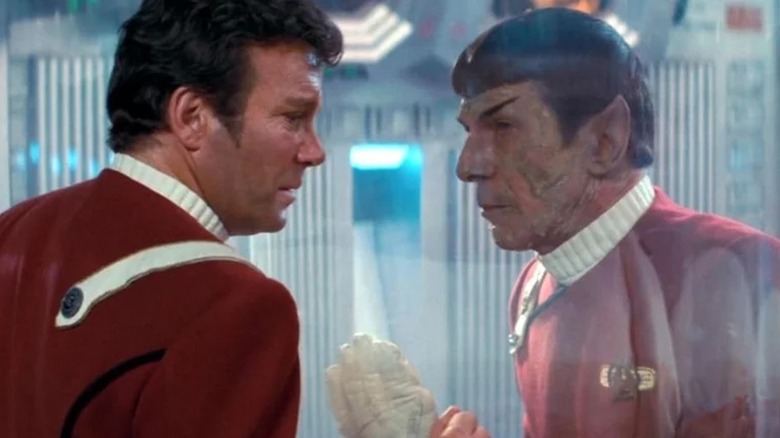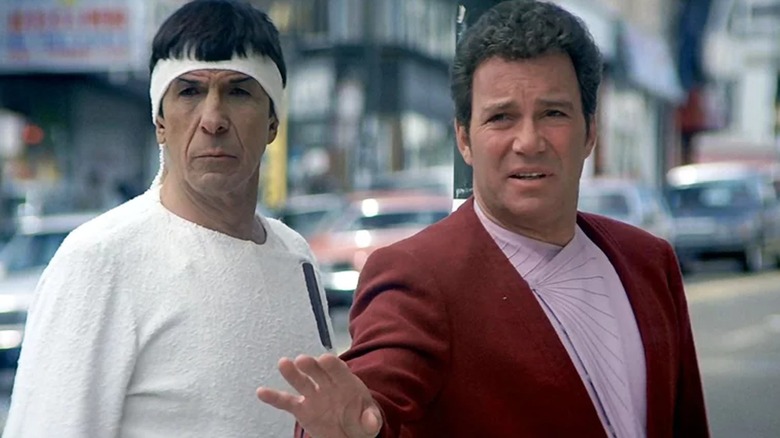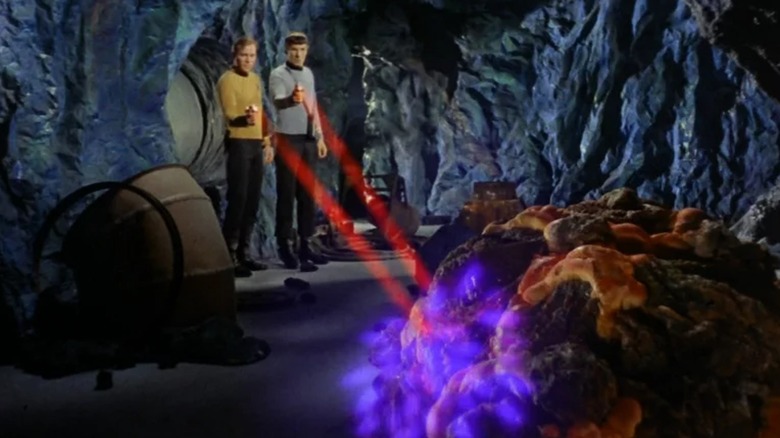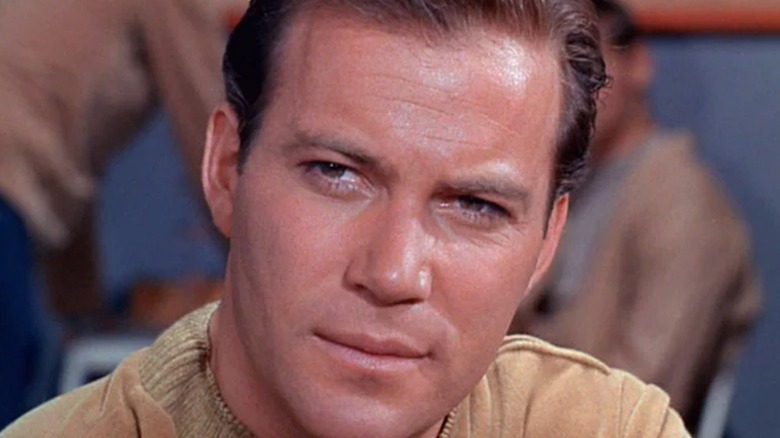The Canceled Star Trek Movie That Could Have Changed The Entire Franchise
It's possible that the best "Star Trek" movie of all time could be the one that never existed. Before Gene Roddenberry's hokey but heartfelt '60s sci-fi series made the leap to the big screen with a series of wildly inconsistent movies beginning in 1979, the franchise nearly went in an entirely different direction. If not for a studio exec who hated science fiction, and creative differences in the writers' room, the first "Star Trek" film would have been "Planet of the Titans," an incredibly ambitious project that was developed over 7 months before being shelved for good, according to the book "The Fifty-Year Mission."
The first "Star Trek" oral history book from Edward Gross and Mark A. Altman, subtitled "The First 25 Years," sets the record straight on many moments from "Trek" history that have become the stuff of legends, but few are more interesting than the story of a near-miss movie idea that first came to fruition in 1976. "Planet of the Titans" was much more than just a script or a concept; according to those involved, it was a project that was loaded with talent, including acclaimed director Philip Kaufman ("Invasion of the Body Snatchers," "The Right Stuff"), then first-time producer Jeffrey Katzenberg (several decades' worth of Disney and DreamWorks classics), and production designer Ken Adam (James Bond, "Barry Lyndon").
In addition to this roster, "Don't Look Now" writers Allan Scott and Chris Bryant penned the script draft, while "Star Wars" concept artist Ralph McQuarrie was reportedly on board. Gerald Isenberg produced and (according to interviews in Gross and Altman's book) seemed to have a line on what Paramount wanted at any given moment, while — and this is perhaps the most jaw-dropping aspect of the whole aborted project — Kaufman wanted legendary Japanese actor (and heartthrob) Toshiro Mifune to play the film's main Klingon villain. "Toshiro Mifune up against Spock would have been a great piece of casting," Kaufman told interviewers for the 2016 book.
Planet of the Titans was a Spock-centric script built on lofty ideas
The proposed story for "Planet of the Titans" was just as ambitious as its cast and crew. According to Den of Geek, before the film's draft was in the works, Paramount had already passed on at least three other "Trek" movie ideas, including an existential Roddenberry script about a computer god, a Harlan Ellison story about reptilian creatures meddling in Earth's timeline, and a black hole-related story from John DF Black, who wrote the famous original series episode "The Naked Time."
The script for "Planet of the Titans" would end up with a black hole too, but it would also include Spock losing his mind during pon farr ("There was going to be sex, which the sixties series never had," Kaufman explained), the crew's search for Kirk, Spock's face-off with a formidable Klingon enemy, an alien race called the Cygnans, and the ultimate revelation that the Enterprise crew inspired the Greek Titans of myth. At one point during its development, the film would've ended with Spock having accidentally caused the spark of civilization by introducing cavemen to fire. The whole thing was influenced by Olaf Stapledon's mind-boggling sci-fi book "Last and First Men," according to Isenberg, with Comic Book Resources noting that an earlier iteration of the movie also pulled from Erich von Däniken's controversial, conspiratorial text "Chariot of the Gods?"
Interestingly, Isenberg says that Kaufman was particularly interested in Nimoy as the leading man, and if "Planet of the Titans" had gone ahead, it seems likely that Captain Kirk may not have been seen as the franchise's protagonist after the movie's release. In fact, Kirk wasn't included in early drafts of the script at all after William Shatner initially decided to sit the film out. Scott says that after Shatner joined four to six weeks into the process, the entire script had to be overhauled. This wasn't the first sign of trouble with the project, and it wouldn't be the last.
Roddenberry was at odds with the project's director and writers
Behind the scenes of "Planet of the Titans," everyone seemed divided about the direction the project should take. Kaufman imagined the film — which sources say ended up with a planned budget of 10 million dollars — as a visually striking sci-fi epic, something on the scale of "Planet of the Apes" or "2001: A Space Odyssey." As he told Gross and Altman, "If properly thought out and expanded, [it] could be a fantastic event." Isenberg confirmed that the group was putting their all into the project, not planning for a multi-film franchise but "thinking we would make one good movie. Roddenberry, meanwhile, wanted the film to be more like an expanded episode of "The Original Series," something Kaufman says Paramount clearly wasn't interested in.
The director wasn't either. "I thought science fiction should go forward and I thought that the order was to go boldly where no man has gone before, but Roddenberry wanted to go back," he said in "The Fifty Year Mission." Despite these fundamental disagreements, hype for the project was already being seeded in the press. The studio apparently took out an ad in the New York Times declaring that "early next year, Paramount Pictures begins filming an extraordinary motion picture adventure — Star Trek," while Scott and Bryant were already being invited to fan conventions. Scott says that the writers met with most cast members from the original series, spent weeks re-examining episodes of "The Original Series," read 30 or more science fiction books, and even got a NASA adviser on board to help with scientific accuracy.
The movie got axed because studio execs didn't like sci-fi
"Planet of the Titans" wasn't the most harmonious project behind the scenes, but in the end, it sounds like its cancellation came down to one frustrating factor: the taste (or historic lack thereof) of studio executives. David V. Picker, who was president of Paramount motion pictures around this time, admitted that the "Star Trek" movie was the only project he ever worked on that he was "simply not interested in." In the franchise's oral history, Picker revealed that he "disliked sci-fi," and that if he had been asked to greenlight George Lucas' "Star Wars," he no doubt would've said no to that, too. Barry Diller, who was CEO of Paramount Pictures at the time, also wanted to move the company back towards the TV space, according to Gross and Altman.
Accounts differ on whether or not Paramount even looked at the final version of the "Planet of the Titans" script. Scott said that he turned in a script that was finished on the fly, as the group was still not in agreement about various story elements. "We were in very short time of our delivery date," he recalled. "We made various amendments, wrote the script, went to the studio with it, and they turned it down." After their departure, Kaufman remembers still working on another script — and being on a roll with it, having finally felt that he cracked the story — when Isenberg called to tell him it was canceled. "They said there's no future in science fiction," he recalls the producer saying, in what must be one of the most painfully ironic moments in Hollywood history. ""They just canceled it," Kaufman claimed. "They never saw my treatment, nobody read it."
After seven months of toiling, the project was dead on arrival. Fans never got to see Toshiro Mifune play a "Star Trek" villain, nor Nimoy's Spock go fully sex-crazy during pon farr, nor the Enterprise crew inspire the future of mankind from the prehistoric days on. We never saw what early "Star Trek" might look like when its blueprint wasn't TV, but some of the best science fiction films of all time. In fact, fans never really got to see what "Star Trek" would have looked like in the '70s, if it had been reborn into a decade of fantastic, stylish, groundbreaking cinema.
According to Den of Geek, Scott and Bryant celebrated the end of their "Star Trek" journey with a goodbye party, where they were given gifts like aspirin and anti-"Trek" T-shirts. Kaufman would go on to put Nimoy in "Invasion of the Body Snatchers," and says he gave him some Spock-like qualities in that film on purpose. And "Star Trek" itself would survive and thrive, albeit a little bit later, a little bit smaller-scale, and without the too-good-to-be-true team that had been assembled to work on "Planet of the Titans."



